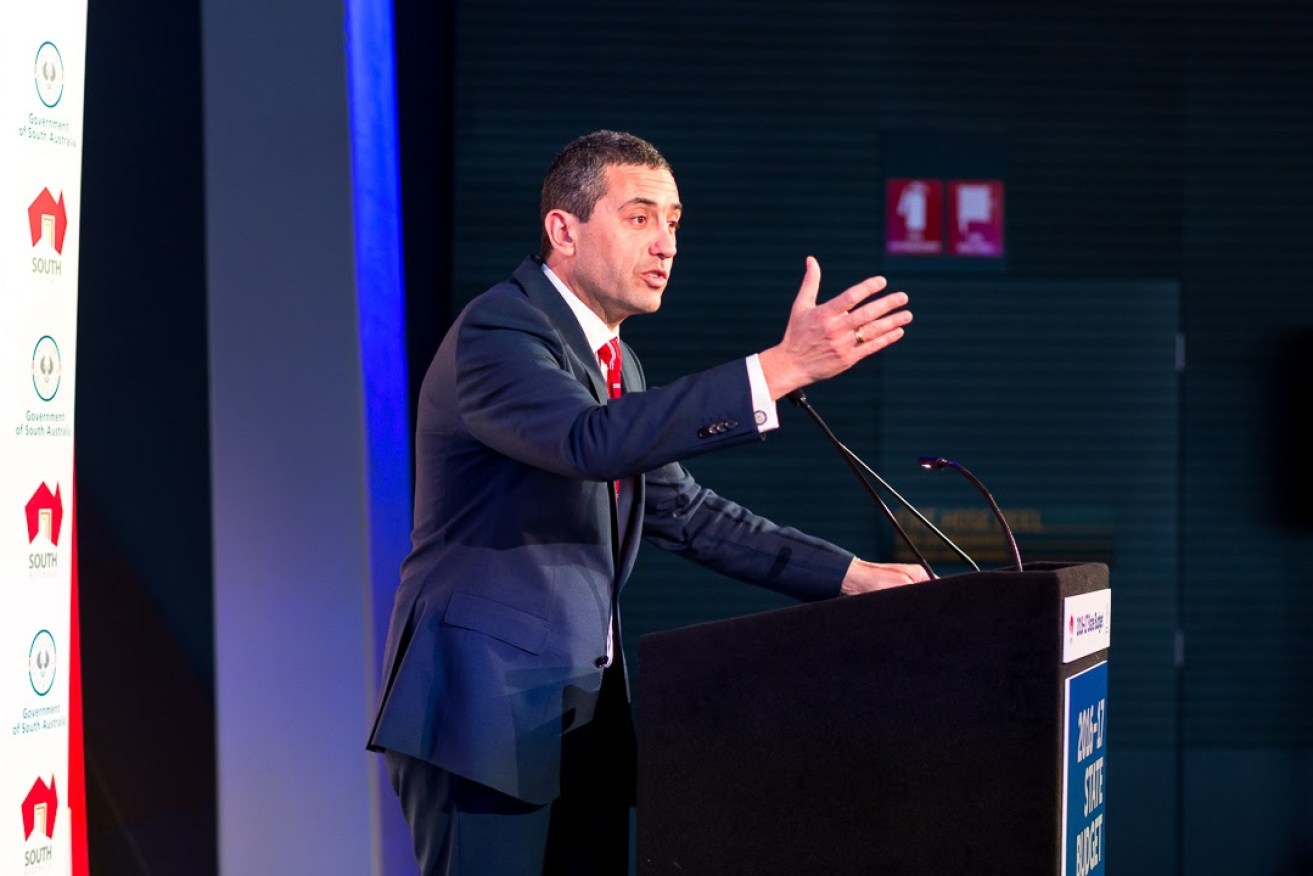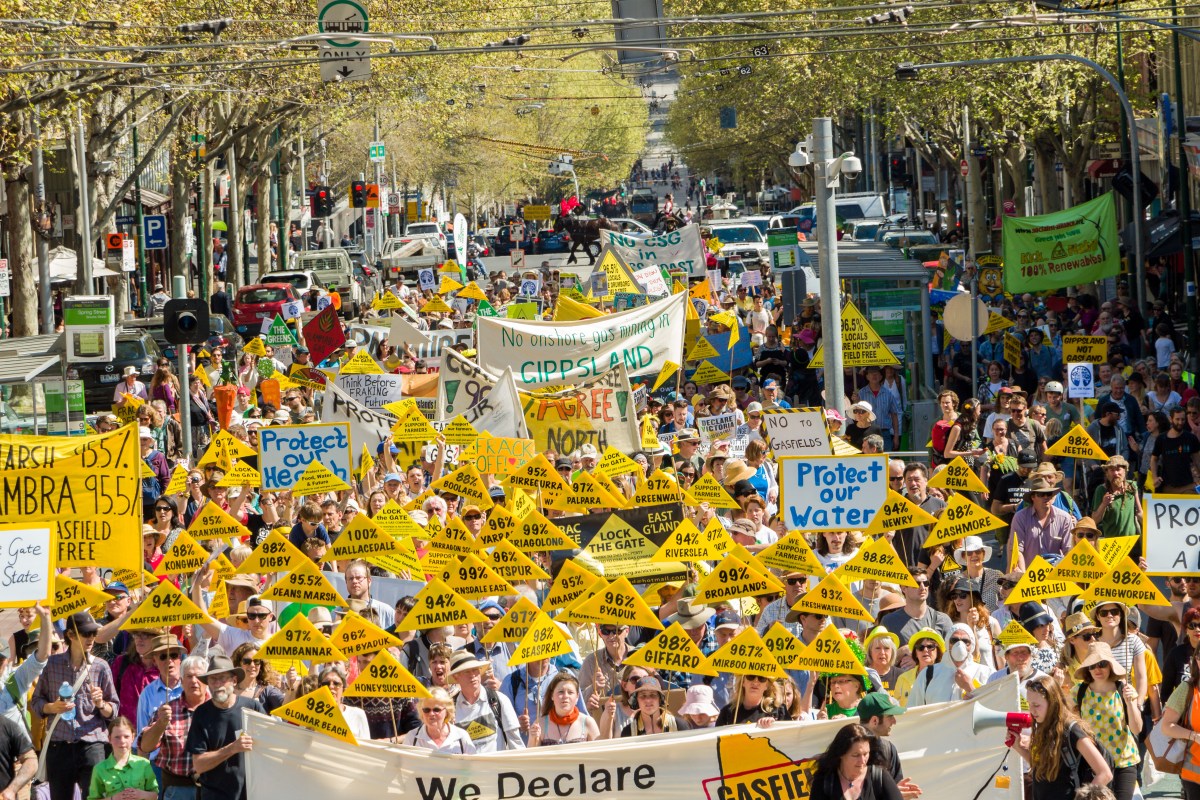Come to SA, Koutsantonis tells gas companies after Vic fracking ban
Treasurer Tom Koutsantonis has delivered a swipe at his Labor colleagues in Victoria – and spruiked for the business of unconventional gas miners – after the Andrews Government opted to permanently ban fracking in that state.

Tom Koutsantonis won't be following his Victorian counterparts in banning fracking. Photo: Andre Castellucci / InDaily
The legislative ban, which formalises Victoria’s moratorium on fracking and will be introduced into parliament later this year, will prohibit the exploration and development of all onshore unconventional gas in the state.
“Our farmers produce some of the world’s cleanest and freshest food – we won’t put that at risk with fracking,” Premier Daniel Andrews said in a statement this morning.
“Victorians have made it clear that they don’t support fracking, and that the health and environmental risks involved outweigh any potential benefits.”

A large crowd hold signs as environmental protesters and farmers march in Melbourne to declare that coal seam gas fracking is not welcome in Victoria. Photo: AAP
Until the legislation passes, an existing moratorium on onshore unconventional gas exploration and development – including fracking and coal seam gas – will remain in place. The Government will also extend the current moratorium on onshore conventional gas drilling until mid-2020.
But Koutsantonis, who is also minister for Mineral Resources and Energy and a vocal advocate for unconventional gas exploration, told InDaily in a statement: “I strongly believe that the approval or otherwise of gas exploration and extraction projects should be left to independent experts, rather than to politicians.
Very disappointed with Victoria's decision to ban unconventional gas. However that offers large opportunities for SA Oil & Gas explorers.
— Tom Koutsantonis MP (@TKoutsantonisMP) August 30, 2016
“We have the best regulatory systems in the world in this country and those systems should be trusted to protect the environment, the agriculture industry and communities.
“This decision is bad news for the National Electricity Market because new sources of supply of gas – which is used for electricity generation – will continue to be constrained.”
Koutsantonis also said gas was a “much cleaner form of generation than coal and an essential component in the transition to a low-carbon future”.
“So this move is also bad news for the environment,” he said.
However, he used the Victorian ban to once again position SA as “open for business” for the controversial extraction method.
“I encourage any exploration companies affected by this decision to consider coming to South Australia, where the assessment and approval of projects is left to expert regulators,” he said.
In a statement today, the Victorian Government said its decision was predicated on the results of a 2015 parliamentary inquiry which received more than 1600 submissions, “mostly opposed to onshore unconventional gas”.
“It is clear that the Victorian community has spoken – they simply don’t support fracking,” the release said.
“The Government’s decision is based on the best available evidence and acknowledges that the risks involved outweigh any potential benefits to Victoria.”
But the Australian Energy Council lamented the move, saying it was “short-sighted and ignores the important role gas will play in supporting renewables integration and reducing carbon emissions as the energy sector transforms”.
Chief Executive Matthew Warren said developing Victoria’s gas reserves was “critical to maintaining downward pressure on both energy prices and carbon emissions” – and cited SA’s own failings as a cautionary tale.
“Gas has half the carbon emissions of coal, and delivers flexible, reliable energy at times when renewable sources may be unavailable,” he said.
“The Victorian Government’s plan to install over 5000 megawatts of wind generation will mean that Victoria’s electricity system will be increasingly reliant on gas as a flexible back-up fuel. Scarce gas supplies will make this more challenging, as we saw in South Australia last month, where spot gas prices peaked at almost $30/GJ, or up to five times long-run prices.
“This is a very disappointing response from the Victorian Government, and can only mean bad news for its energy prices and gas supply into the future.”
Nonetheless, environmental groups applauded the decision.
“Victoria has become the first state in Australia to put in place a total ban,” Friends of the Earth spokesman Cam Walker said in a statement.
“The decision to ban the destructive unconventional gas industry will be seen as the right move by generations to come.”
The Australian Workers’ Union, however, said the moratorium on onshore conventional gas mining for the next four years would threaten jobs.
“If new exploration and extraction is not allowed there will be an exodus of investment and jobs from Victoria,” AWU Victorian secretary Ben Davis said in a statement.
“If anything, allowing new onshore conventional gas exploration and extraction reinforces the validity of the ban on fracking.
“The reserves are there and we do not need to pursue unconventional sources.”
Victorian Greens energy spokesperson Ellen Sandell is disappointed Labor has left the door open to conventional gas drilling after the next state election.
“We won’t stop fighting until all onshore gas drilling is banned,” Sandell said.
But the Australian Petroleum Production & Exploration Association released an expectedly scathing response, saying the Victorian Government was “playing politics… just days after the COAG Energy Council confirmed the urgent need to develop new gas supply to prevent a looming shortfall”.
“There is no environmental reason to prohibit onshore gas development in Victoria,” said APPEA chief executive Malcolm Roberts.
“The technology is proven and safe. In the case of conventional gas, Victoria has had decades of safe local production.
“Every independent, scientific inquiry confirms that, properly regulated, unconventional gas is safe. Activist fear campaigns can create confusion and uncertainty in the community but our political leaders have a responsibility to rise above such campaigns and support an honest, factual debate.
“The decision today is short-term politics that will leave Victoria exposed to unnecessarily high energy prices.”
-with AAP




